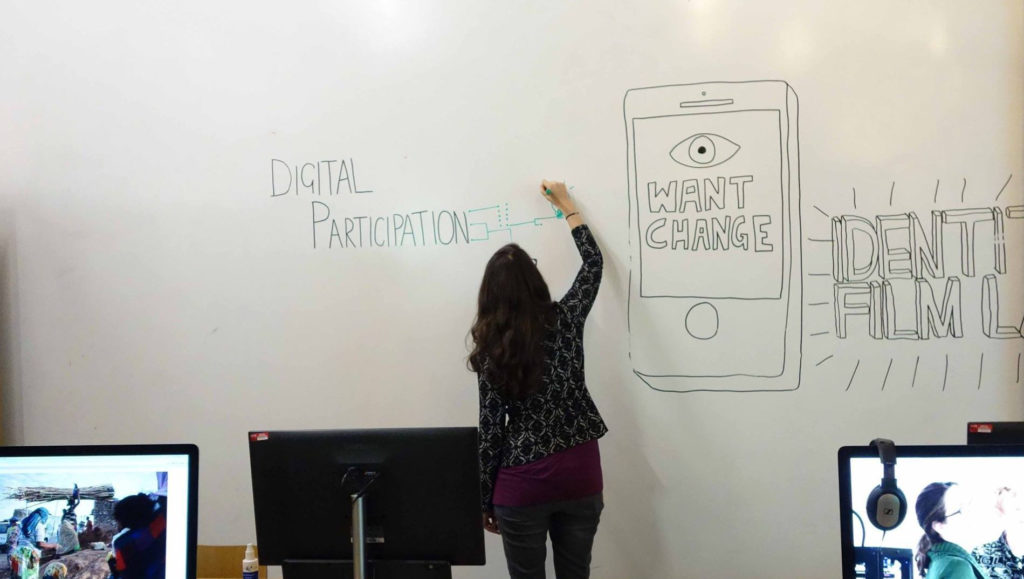
Who leads participation and socially engaged practice when it comes to digital?
Before I start this brief collection of thoughts and observations into the current position of what we know as ‘digital participation’ in the arts and culture sector, it is important for me to note that this is just that, my thoughts and feelings to where artists and organisation are in relation to the facilitation and delivery of digitally engaged projects. This is not to pick fault in gaps in provisions and support, but to question the current structures and whether they are fully addressing the needs of those practicing in participatory arts in relation to digital?
I have attended a number of meetings, and had many conversations, with staff and organisations from many areas of the arts and culture sector, who generally present the same questions and issues surrounding digital engagement. These include finding suitably skilled delivery facilitators and artists; identifying capital investment opportunities in equipment; sourcing funding for projects that don’t involve prototyping or product development; accessibility and digital support aids; an understandable common language between the creative industries and socially engaged practices; support networks for shared practice; and more often than not, a level of confidence in taking the step towards using digital practices in an organisations work (not it’s structure). At the most recent #DigitalpARTicipationis event at Level Centre, one delegate highlighted the perceived barrier of the skill required to deliver digitally participatory projects and raised and interesting (and in my opinion correct) argument for digital engagement:
“The event helped me to understand my distrust/dislike of digital work and it’s because my skillset is limited, which made me question: I am not a graffiti artist, does that mean I would shy away from a graffiti project? No, is the short answer – I would just work with someone that did have that skillset.”
However, the perceived barrier that digital is outside the skill set of an organisation or artist is a just one. Organisations are getting great support in developing their infrastructure and audience engagement through initiatives like The Digital Culture Network, but what about facilitation skills, exploration of digital tools and materials, or CPD in digital practices? The Digital Culture Network supports digital skills development, which is more about back office, content production and online audience engagement through digital marketing etc, rather than actual participatory work. This does make me wonder if there is an element of tech and digital championing that’s missing?
We also have Arts Council Relationship Managers, who are great individual sources for accessing knowledge and signposting to digitally focus funding opportunities and are extremely supportive in the development of organisations digital engagement with their audiences and are great for finding appropriate funding sources, but I also wonder if there could be a more connected approach to digital participation and socially engaged work with communities and participants? New appointments like the Director of Arts Technology and Innovation is a good indicator (of many) that the Arts Council are taking digital engagement seriously, but this is just part of this role and I can’t help but wish there was someone involved in a more focused position.
For me, there is a wealth of examples of great digital participation work in the arts and culture sector, being delivered by a whole host of staff, artists and tech experts that contribute to a rich pool demonstrating the positive impact digital participation has on their communities and the sector as a whole. I often find myself searching online for digital participation projects, initiatives and strictures in arts and culture and the most common result is the Scottish Digital Participation Charter (https://digitalparticipation.scot/) and the like, which are fantastic at addressing gaps in digital literacy and citizenship skills, and I can’t help but want to see a similar framework that supports creative digital participation in England and the wider UK.
But what would this look like? Who would support it?
If you’re reading this and can see holes in my thinking, have a concern/need I haven’t picked up on, or even want to share a good example of digital participation practice, PLEASE, drop me a line! I really do want to see a more holistic and strategic approach to developing and supporting digital participation in arts and culture, and welcome all and any insights into how we can make this possible.